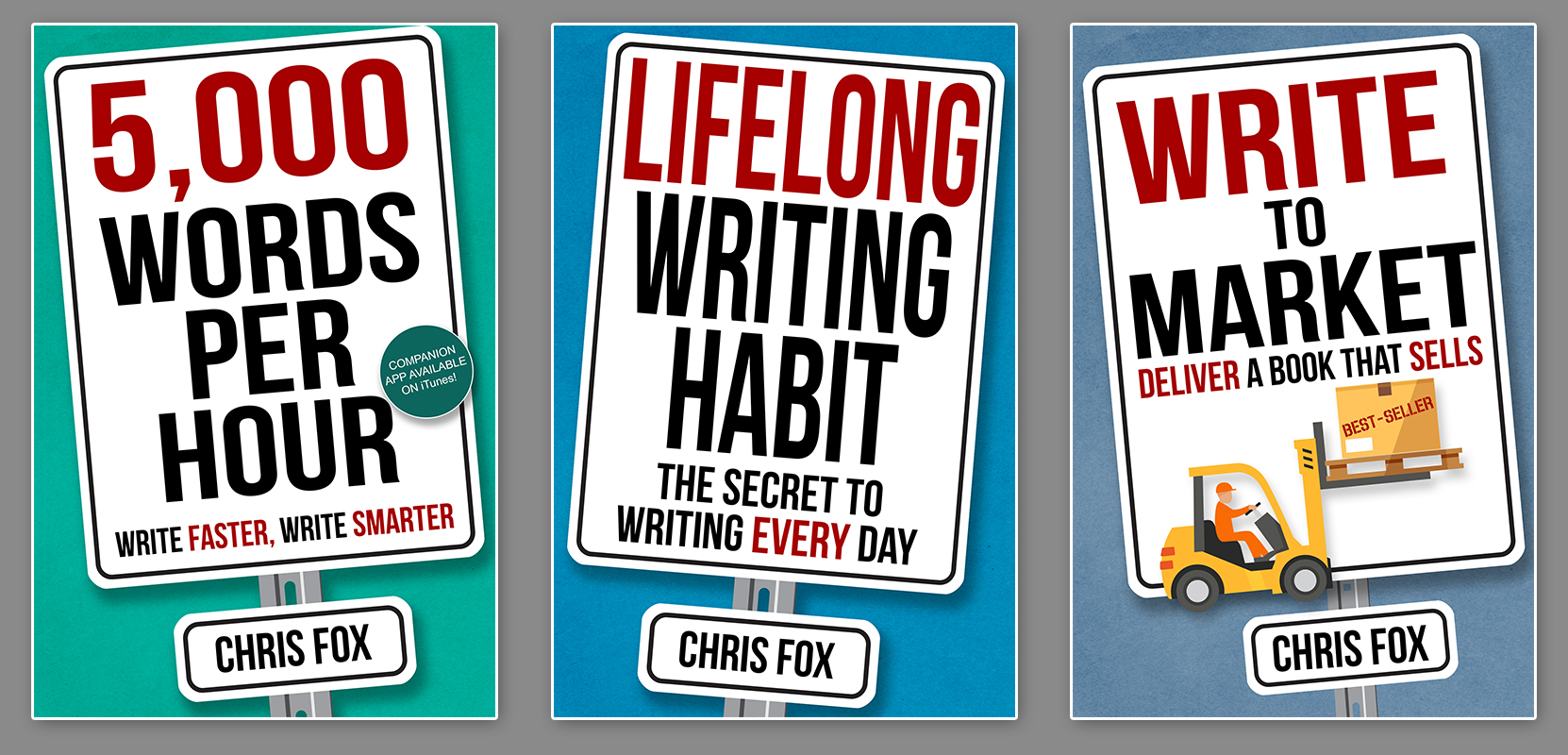Regular guest Chris Fox kindly gave us permission to reblog his post in full.
Writing a novel is an immense undertaking, and before you finish it you think it’s the most daunting thing you’ll ever do. Then you DO finish it, and suddenly you need to figure out how to get people to read it.
Before long you realize you need to learn this strange sorcery called marketing, so you start asking around, reading blog posts, and digesting anything else you think will help. Then you start posting ‘look I wrote a book’ to Facebook, Twitter, and anywhere else you think people might see it.
People throw rotten tomatoes, and you quickly retreat back into your introvert shell. You realize that all the Facebook groups you joined are full of other people like you who are also yelling BUY MY BOOK as loudly as possible.
The method described above is the hunting approach. Your prey are readers, and you are stalking them through the internet wilds. The sad reality is that isn’t very effective. Readers are canny prey. You must get them to come to you.
Brute force isn’t going to work. Spam isn’t going to work. You need to find a way to get your book in front of the right people, and do it in such a way that they are receptive to even hearing about a book.
You need to take the farmer’s approach. A farmer knows that harvesting a crop will take an entire season, and that if they don’t tend to their crop it will wither and die. It isn’t a quick process, but if they are diligent the day will come when they reap a bountiful harvest.
Plant the Right Crop
 A farmer begins by selecting the right soil, and planting the right crop. They don’t haphazardly scatter seeds. They plan. They visualize their crop, and know what they want their harvest to look like before they even get started.
A farmer begins by selecting the right soil, and planting the right crop. They don’t haphazardly scatter seeds. They plan. They visualize their crop, and know what they want their harvest to look like before they even get started.
For writers this means writing the correct book. If you’re an unknown author writing poetry, you’re really going to struggle to get traction. No amount of marketing will get people to shell out money for it.
Simply put, there is no market for it. If you want to succeed at this publishing thing it begins with writing to market. I realize that phrase makes many people feel dirty, but that’s largely because most people don’t understand what it means.
Writing to Market doesn’t mean cranking out a Hunger Games clone, or that the only route to success is shifting to romance when you want to write science fiction. It means you need to make sure there’s an audience for what you’re writing, and that you’re writing it
in such a way that your target audience recognizes that this was written for them.
That’s a lengthly topic, but fortunately (shameless plug) I’ve written a book to teach you all about it. Check it out if you’re curious.
For those who want the quick and dirty version about writing to market, here it is. There are dozens of subcategories for every category on Amazon. Let’s say you like science fiction, and you’re considering writing a book about aliens invading. I’ll give you the hunter version, and the farmer version.
Hunter: Write your awesome invasion book. Get a cool cover. Write the best blurb you can. List the book on Amazon. Start marketing, which means alerting social media, maybe buying some Facebook ads, and possibly submitting your book to book sites like ENT or BookBub.
This method could work. People might really like your book. Or, it could totally fail. It’s really a roll of the dice, because the market is a fickle place. Following the hunter version is taking a big risk, and the odds are against you.
Farmer: The farmer goes to Amazon and looks at the Alien Invasion subcategory. They study the books there. What are the covers like? How do the blurbs read? What are the tropes those books are using? What are the heroes / heroines like?
The farmer reads a few best sellers to get a feel for what readers are buying. Then and only then does the farmer try to plot their novel. They’re still writing their kick ass alien invasion story, but they’re also making sure it conforms to what’s currently working in the market.
A farmer’s work begins before the first word of the novel is written. Farmers are all about preparation. Hunters might find game, or they might come home empty handed. They trust to luck, hoping that they’ll find game in the jungle.
Plant Many Seeds
 Farmers know that only a portion of the seeds they plant will bear fruit. Some will wither. Others will get parasites. So they plant a lot of seeds. They water all of them, but they focus on the ones that sprout.
Farmers know that only a portion of the seeds they plant will bear fruit. Some will wither. Others will get parasites. So they plant a lot of seeds. They water all of them, but they focus on the ones that sprout.
You need to do the same thing. A full 75% of the things I try in marketing fail miserably. They produce no results, and in some cases have cost me many hundreds of wasted dollars. But you know what? 25% do work. They sprout, and the instant I see which ones do I know where to focus my energy.
When I launched No Such Thing As Werewolves I spent over a thousand dollars on paid advertising. I only generated about $100 in sales, and because I didn’t know what a Kindle Countdown Deal was I only received half the royalty I’d have otherwise gotten.
At the same time I started talking about the book on a few gaming forums where I was a regular poster. I was simply telling friends, because I was proud of what I’d done. I wasn’t trying to sell books. To my surprise, I started selling books. A lot of books. People knew that I was a genuine, active, and authentic gamer geek. Just like them. So they wanted to support me.
So how does this relate to our alien invasion example about? I’ll give you both approaches.
Hunter: The hunter does an immediate media blitz when the book launches. They post ‘hey my book is out’ on Reddit, Facebook, and everywhere else they can think of. This all happens over the course of a few days.
They end up with a whole lot of down votes, some angry comments, and a few people unfollowing them. They might get a sale or two, but rarely more.
Farmer: The farmer puts their new book into their signature on a couple forums. They may announce it once to show off their snazzy new cover. They become more active in places where people might like their book, like the /r/scifi subreddit over on Reddit.
The farmer approaches some of their favorite science fiction podcasts asking if they can be a guest. They network with other authors in their genre, and study how the successful ones behave. They give of their time, knowing that eventually those favors will present opportunities.
Tend Your Crop
 A farmer doesn’t plant his crop, then show up three months later to harvest. The farming approaches requires slow, steady work to succeed. It requires deliberate planning. That farmer is out there every day doing the work needed to get his crop to grow.
A farmer doesn’t plant his crop, then show up three months later to harvest. The farming approaches requires slow, steady work to succeed. It requires deliberate planning. That farmer is out there every day doing the work needed to get his crop to grow.
You need to do the same. This is a marathon, not a sprint. Every day you should be doing something to help grow your brand. That can be a blog post, contributing to forums in your genre, networking with other authors, or a dozen other activities.
The key is consistency. Work continuously to strengthen your brand. You don’t need to do a massive amount of promotion on any given day, and in fact it’s a good idea NOT to do that.
A better approach is doing one small thing, even if that small thing isn’t directly related to your books. When a farmer kills aphids it won’t immediately generate tomatoes, but it will help ensure that months down the road he has a bountiful harvest.
I talk about my love of fantasy books on the Fantasy subreddit all the time. Not because I want to sell books, but because I love fantasy and was doing it long before I started publishing. This has generated quite a few sales, because every one of my posts has ‘writer Chris Fox’ written next to it.
I’m never consciously trying to sell books when I post, but that daily activity sells them anyway.
Hunter: The hunter isn’t concerned with the long term health of their crop. They want sales, and they’ll do whatever they think will achieve them. They’ll spam Twitter, Facebook, and any other channel they can to get eyes on their book. This only ends up pissing people off.
Farmer: The farmer contributes. They become active in a lot of communities where people might be interested in their work, but they don’t actively push that work. Over time people learn about it, and they embrace that person, because they’re an authentic part of the community.
The Power of Orchards
 Orchards take years to grow before you see your first fruit. But once you have grown that orchard, the trees will continue to flower year after year. The same is true of many of the basic marketing tactics you should employ.
Orchards take years to grow before you see your first fruit. But once you have grown that orchard, the trees will continue to flower year after year. The same is true of many of the basic marketing tactics you should employ.
Articles like this are a great example. I wrote one a while back about how writers can use gamification to increase their word count. People loved it, and it generated a ton of immediate traffic. It will live on my blog for years, and contains a link to at least two of my books. People still share it, and periodically I may trot it out again on social media. I’ll continue to see traffic as a result, and the more articles I write, the more residual traffic I see.
This will work for fiction too. Let’s say you write epic fantasy. Presumably, you also love to read it. Why not make a top 20 favorite fantasy novel post? Or review Jim Butcher’s latest work? Every time you write an article that potential readers might stumble across you’ve planted another tree.
Over time you’ll grow an orchard, and see a slow but steady flow of the right kind of traffic to your site. Note that you can’t just plant anything for this to work. If your audience loves apples, then you’d better be planting apple trees.
Right writing is key. Know your market.
Hunters: This should sound familiar now. The hunter will keep spamming the same channels. They may add a few new channels, but it won’t matter because saying buy my book over and over is a sure fire way to make sure no one buys your book.
Farmers: Farmers make sure to create content that will interest their target audience. This could be free short stories that tie into their novels, or articles that link to other authors their fans might enjoy. They’re always providing value.
Conclusions
Marketing is a slow, steady process. And that’s okay. If you keep experimenting, if you keep growing your brand, then eventually you’ll reap the rewards. It requires patience. It requires diligence. Writing is hard, and marketing is even harder.
So plant a lot of seeds. Water them daily. Stick with it, farmer, and your harvest will come!



